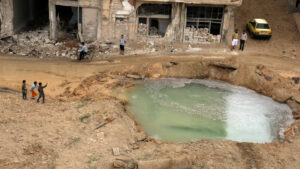During times of war, civilians often bear the brunt of the violence and destruction. They may be killed or injured by bombings, forced to flee their homes, or subject to other forms of violence. Children are especially vulnerable in war zones and may be forced to fight as soldiers, used as human shields, or suffer from trauma and displacement. Women and girls may also face specific forms of violence, such as rape and sexual assault. Additionally, war can cause long-term harm to mental health, as well as economic and social disruption. The destruction of infrastructure, such as hospitals and schools, can also have a devastating effect on communities. Overall, war has a significant impact on the lives of civilians, both in the short and long term.
children in war zones are exposed to extreme violence and trauma, which can have a severe impact on their mental and emotional well-being. They may experience symptoms such as nightmares, flashbacks, and difficulty sleeping, as well as emotional distress such as anxiety, depression, and aggression. These symptoms can persist long after the war is over and can affect the child’s ability to lead a normal life.
Furthermore, children who have been exposed to war may have difficulty in school and may have problems with learning and attention. They may also struggle with relationships and may have difficulty trusting others. Additionally, children in war zones may be at risk of physical harm, such as injury or death, as well as exploitation and abuse, including recruitment as child soldiers.
It’s important to note that war not only affects children’s mental health but also their physical health, access to education, and overall development. These children may have limited access to healthcare, food, clean water, and shelter, which can lead to malnutrition, disease, and poverty.
Overall, the hidden victims of war are the children, who have been forced to endure the horrors of war and have been robbed of their childhoods and futures. It is important to provide support and aid to these children to help them recover and rebuild their lives.
the limited access to mental healthcare is a significant problem for children affected by war. Many war-affected areas lack the resources and infrastructure necessary to provide mental healthcare services, and many children may not have access to appropriate treatment even if it is available.
It is crucial that we take action to address this issue by providing support and resources for mental healthcare in war-affected areas. This can include training local healthcare providers, funding mental health programs, and increasing awareness about the importance of mental healthcare for children.
In addition to providing access to mental healthcare, it is also important to provide children with other forms of support, such as education and safe spaces where they can play and socialize. Providing children with opportunities for education and play can help them cope with the trauma they have experienced and promote their overall well-being.
It’s also important to note that mental health support should also be provided to parents, caretakers and other adults in the community. They are also affected by the war and often suffer from mental health issues themselves, thus providing them with support can also help the children.
In conclusion, the hidden victims of war are the children who have been forced to endure the horrors of war, and it is our responsibility to do everything in our power to help them heal and rebuild their lives. This includes providing them with access to mental healthcare, education, and other forms of support. We must act with compassion and urgency to ensure that these children have a chance at a brighter future.


